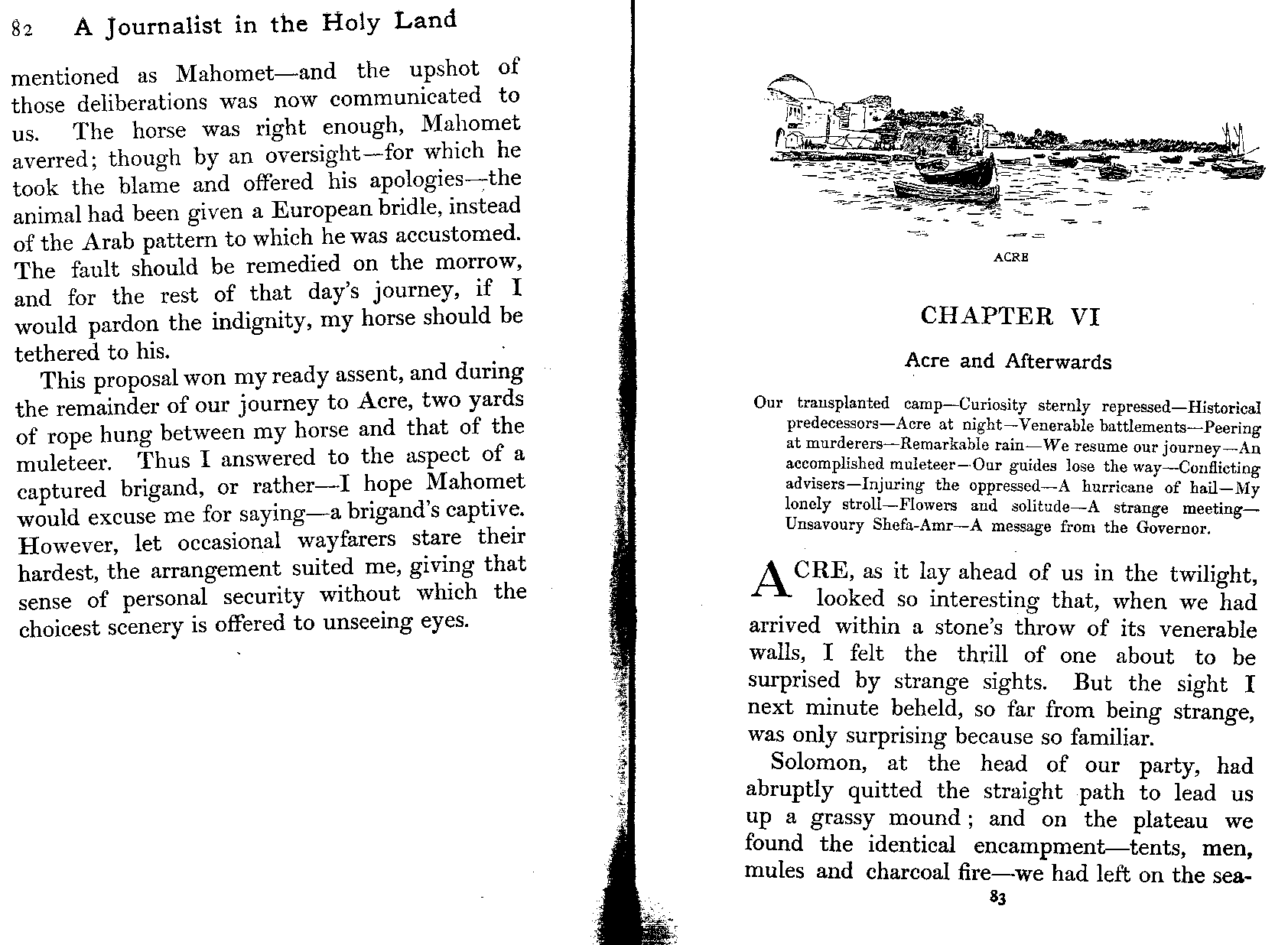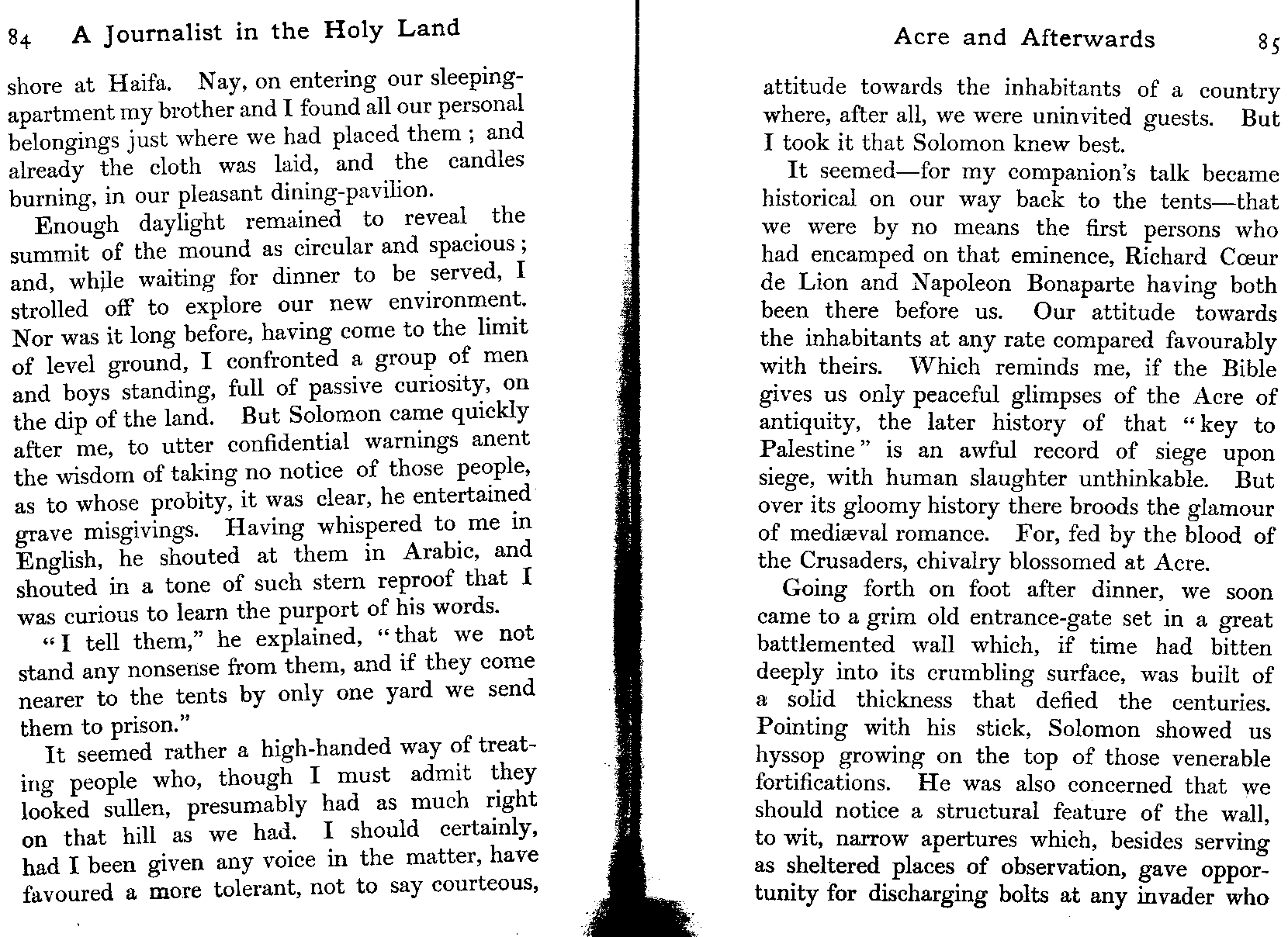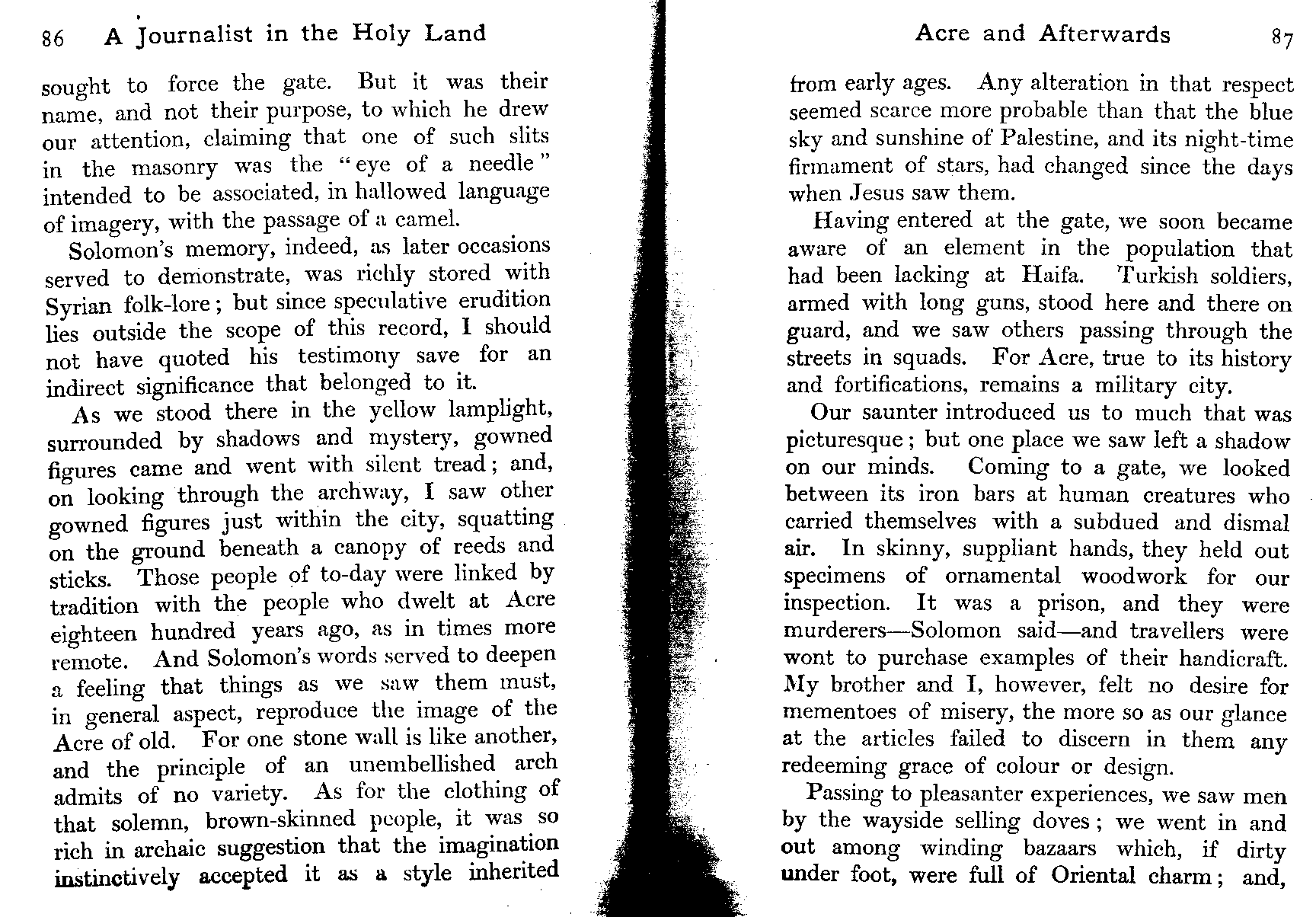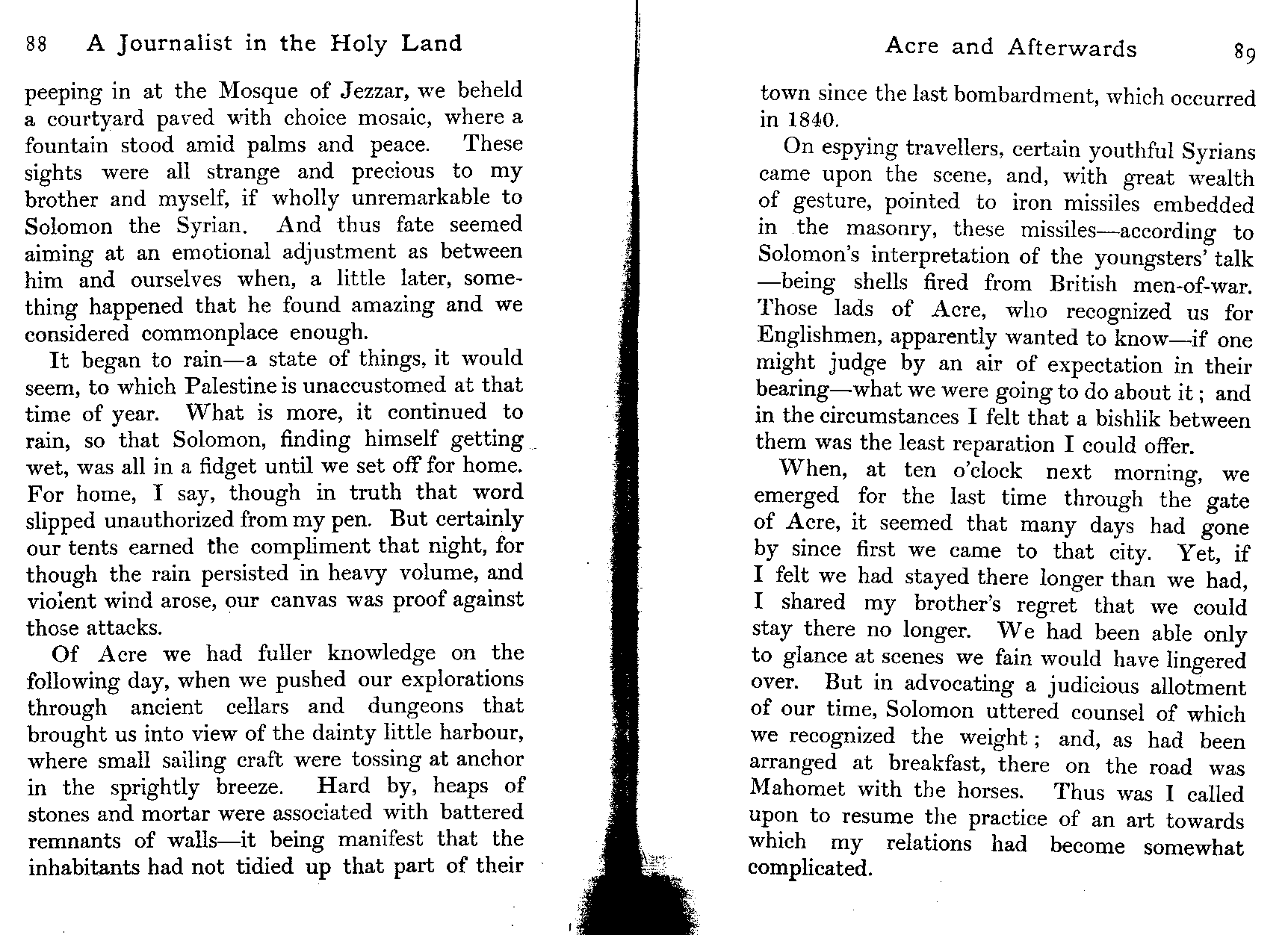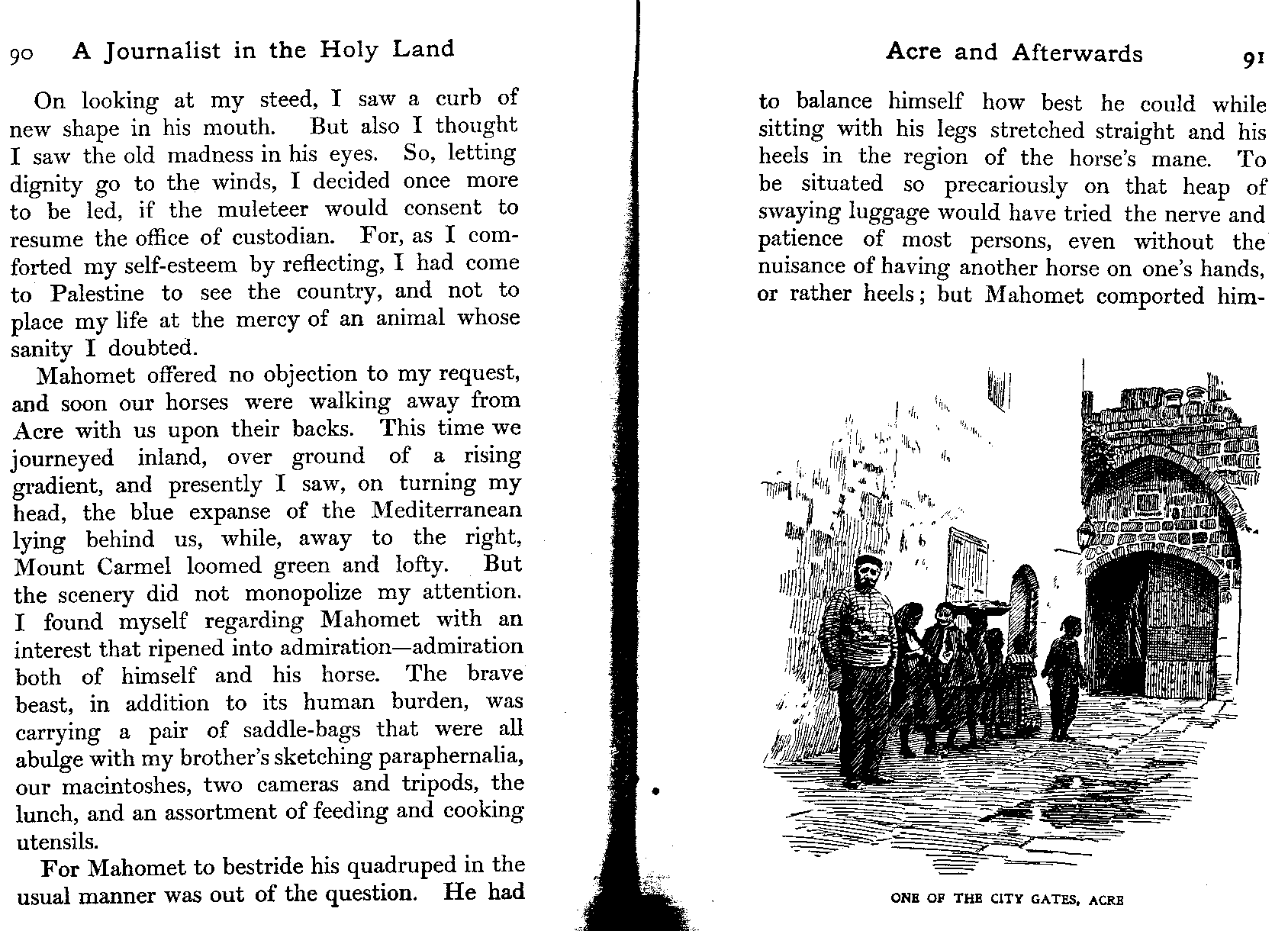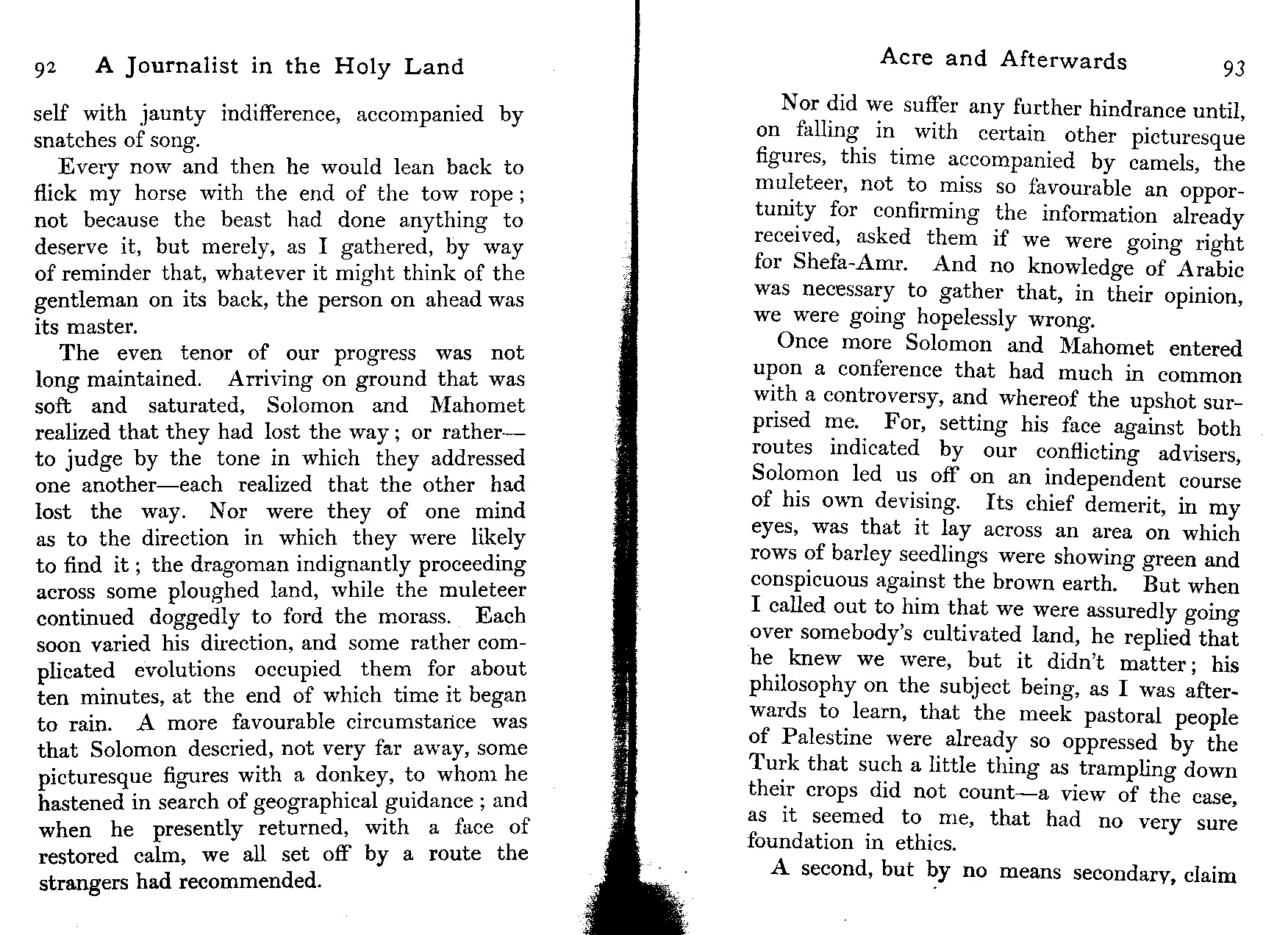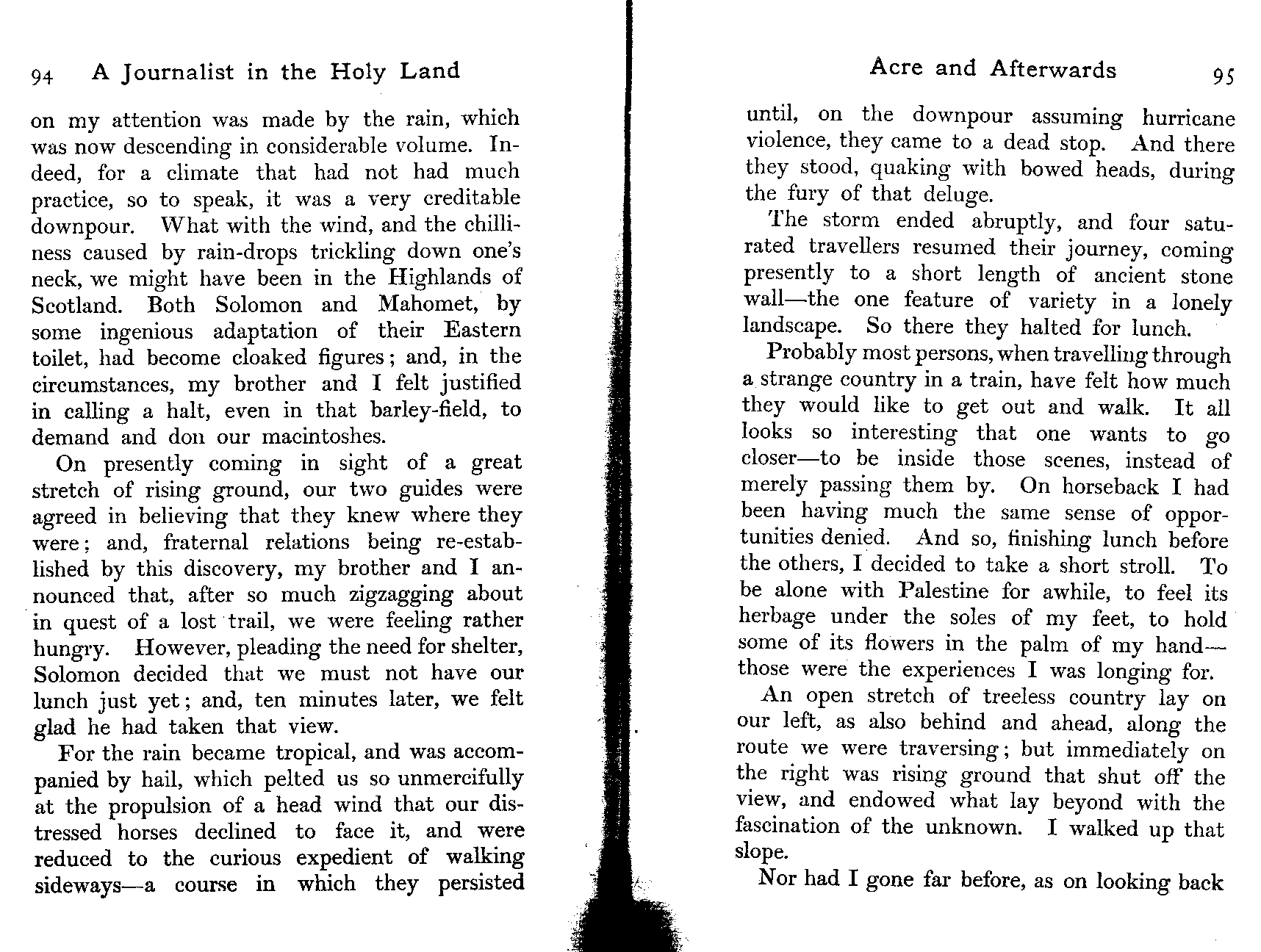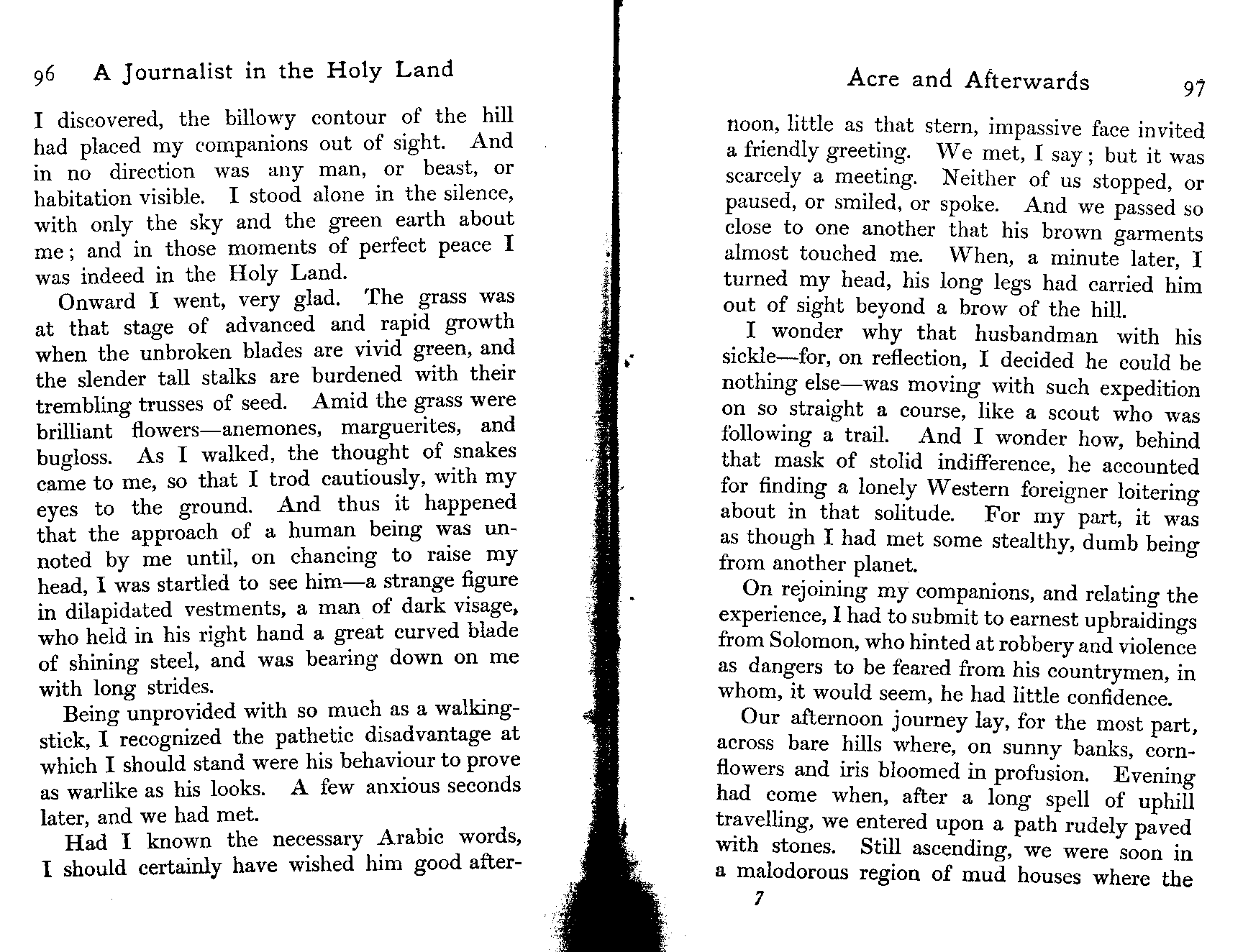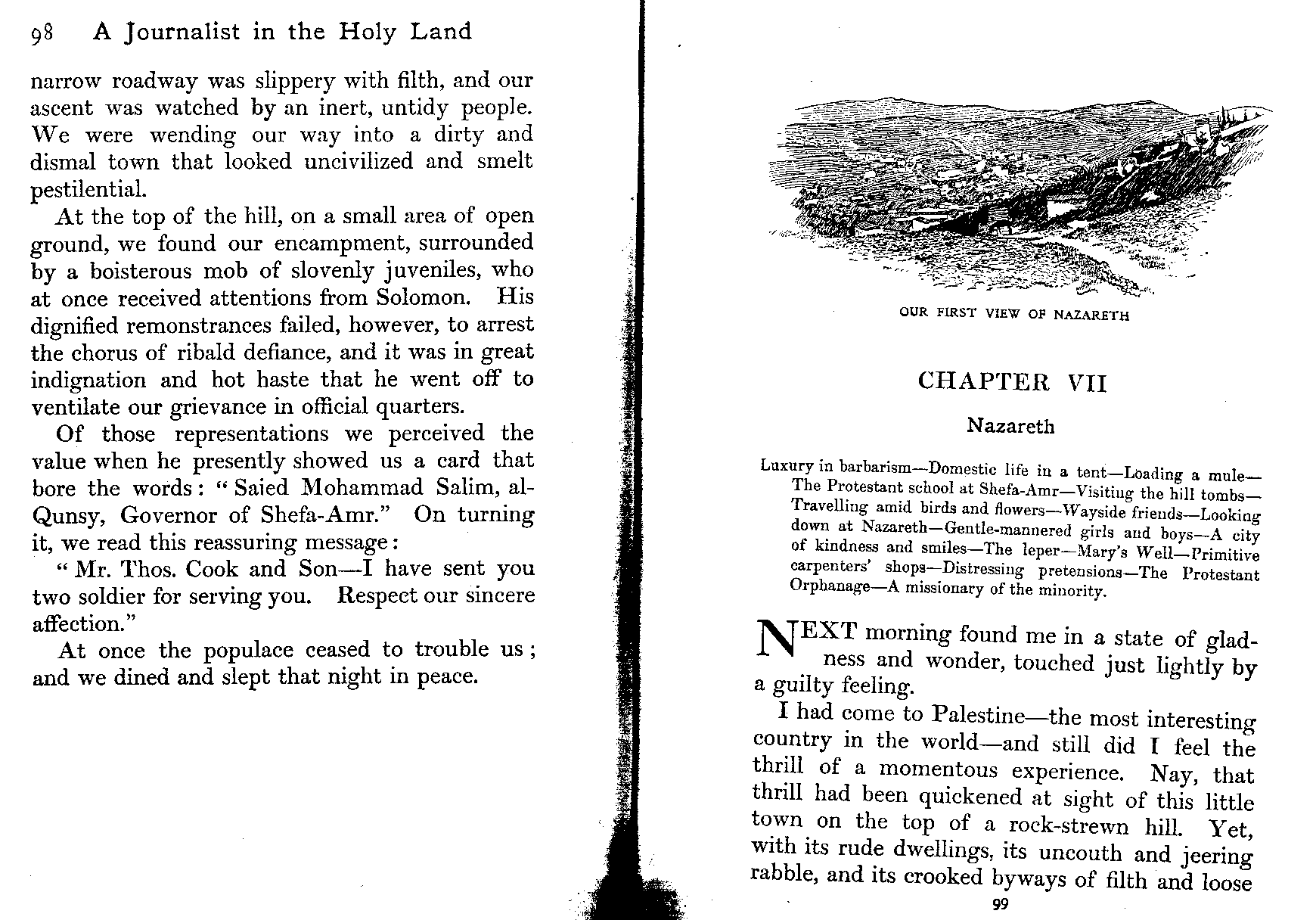
|
|
Abstract: A visit to the Akka and its surroundings in 1913; no mention of the Bahá'í Faith. |
A Journalist in the Holy Land:
Glimpses of Egypt and Palestine
by Arthur E. Copping
pages 82-97Religious Tract Society, 1913-05-23
1. Text
[page 82]... mentioned as Mahomet — and the upshot of those deliberations was now communicated to us. The horse was right enough, Mahomet averred; though by an oversight — for which he took the blame and overed his apologies — the animal had been given a European bridle, instead of the Arab pattern to which he was accustomed. The fault should be remedied on the morrow, and for the rest of that day's journey, if I would pardon the indignity, my horse should be tethered to his.
This proposal won my ready assent, and during the remainder of our journey to Acre, two yards of rope hung between my horse and that of the muleteer. Thus I answered to the aspect of a captured brigand, or rather — I hope Mahomet would excuse me for saying — a brigand's captive. However, let occasional wayfarers stare their hardest, the arrangement suited me, giving that sense of personal security without which the choicest scenery is overed to unseeing eyes.
[page 83]
Acre and Afterwards
Our transplanted camp — Curiosity sternly repressed — Historical predecessors — Acre at night — Venerable battlements — Peering at murderers — Remarkable rain — We resume our journey — An accomplished muleteer — Our guides lose the way — Conflicting advisers — Injuring the oppressed — A hurricane of hail — My lonely stroll — Flowers and solitude — A strange meeting — Unsavoury Shefa-Amr — A message from the Governor.
ACRE, as it lay ahead of us in the twilight, looked so interesting that, when we had arrived within a stone's throw of its venerable walls, I felt the thrill of one about to be surprised by strange sights. But the sight I next minute beheld, so far from being strange, was only surprising because so familiar.
Solomon, at the head of our party, had abruptly quitted the straight path to lead us up a grassy mound; and on the plateau we found the identical encampment tents, men, mules and charcoal fire we had left on the sea-
[page 84]
shore at Haifa. Nay, on entering our sleeping-apartment my brother and I found all our personal belongings just where we had placed them; and already the cloth was laid, and the candles burning, in our pleasant dining-pavilion.
Enough daylight remained to reveal the summit of the mound as circular and spacious; and, while waiting for dinner to be served, I strolled off to explore our new environment. Nor was it long before, having come to the limit of level ground, I confronted a group of men and boys standing, full of passive curiosity, on the dip of the land. But Solomon came quickly after me, to utter confidential warnings anent the wisdom of taking no notice of those people, as to whose probity, it was clear, he entertained grave misgivings. Having whispered to me in English, he shouted at them in Arabic, and shouted in a tone of such stern reproof that I was curious to learn the purport of his words.
"I tell them," he explained, "that we not stand any nonsense from them, and if they come nearer to the tents by only one yard we send them to prison."
It seemed rather a high-handed way of treating people who, though I must admit they looked sullen, presumably had as much right on that hill as we had. I should certainly, had I been given any voice in the matter, have favoured a more tolerant, not to say courteous,
[page 85]
attitude towards the inhabitants of a country where, after all, we were uninvited guests. But I took it that Solomon knew best.
It seemed — for my companion's talk became historical on our way back to the tents — that we were by no means the first persons who had encamped on that eminence, Richard Coeur de Lion and Napoleon Bonaparte having both been there before us. Our attitude towards the inhabitants at any rate compared favourably with theirs. Which reminds me, if the Bible gives us only peaceful glimpses of the Acre of antiquity, the later history of that "key to Palestine" is an awful record of siege upon siege, with human slaughter unthinkable. But over its gloomy history there broods the glamour of mediaeval romance. For, fed by the blood of the Crusaders, chivalry blossomed at Acre.
Going forth on foot after dinner, we soon came to a grim old entrance-gate set in a great battlemented wall which, if time had bitten deeply into its crumbling surface, was built of a solid thickness that defied the centuries. Pointing with his stick, Solomon showed us hyssop growing on the top of those venerable fortifications. He was also concerned that we should notice a structural feature of the wall, to wit, narrow apertures which, besides serving as sheltered places of observation, gave opportunity for discharging bolts at any invader who
[page 86]
sought to force the gate. But it was their name, and not their purpose, to which he drew our attention, claiming that one of such slits in the masonry was the "eye of a needle" intended to be associated, in hallowed language of imagery, with the passage of a camel.
Solomon's memory, indeed, as later occasions served to demonstrate, was richly stored with Syrian folk-lore; but since speculative erudition lies outside the scope of this record, I should not have quoted his testimony save for an indirect significance that belonged to it.
As we stood there in the yellow lamplight, surrounded by shadows and mystery, gowned figures came and went with silent tread; and, on looking through the archway, I saw other gowned figures just within the city, squatting on the ground beneath a canopy of reeds and sticks. Those people of to-day were linked by tradition with the people who dwelt at Acre eighteen hundred years ago, as in times more remote. And Solomon's words served to deepen a feeling that things as we saw them must, in general aspect, reproduce the image of the Acre of old. For one stone wall is like another, and the principle of an unembellished arch admits of no variety. As for the clothing of that solemn, brown-skinned people, it was so rich in archaic suggestion that the imagination instinctively accepted it as a style inherited
[page 87]
from early ages. Any alteration in that respect seemed scarce more probable than that the blue sky and sunshine of Palestine, and its night-time firmament of stars, had changed since the days when Jesus saw them.
Having entered at the gate, we soon became aware of an element in the population that had been lacking at Haifa. Turkish soldiers, armed with long guns, stood here and there on guard, and we saw others passing through the streets in squads. For Acre, true to its history and fortifications, remains a military city.
Our saunter introduced us to much that was picturesque; but one place we saw left a shadow on our minds. Coming to a gate, we looked between its iron bars at human creatures who carried themselves with a subdued and dismal air. In skinny, suppliant hands, they held out specimens of ornamental woodwork for our inspection. It was a prison, and they were murderers — Solomon said — and travellers were wont to purchase examples of their handicraft. My brother and I, however, felt no desire for mementoes of misery, the more so as our glance at the articles failed to discern in them any redeeming grace of colour or design.
Passing to pleasanter experiences, we saw men by the wayside selling doves; we went in and out among winding bazaars which, if dirty under foot, were full of Oriental charm; and,
[page 88]
peeping in at the Mosque of Jezzar, we beheld a courtyard paved with choice mosaic, where a fountain stood amid palms and peace. These sights were all strange and precious to my brother and myself, if wholly unremarkable to Solomon the Syrian. And thus fate seemed aiming at an emotional adjustment as between him and ourselves when, a little later, something happened that he found amazing and we considered commonplace enough.
It began to rain — a state of things, it would seem, to which Palestine is unaccustomed at that time of year. What is more, it continued to rain, so that Solomon, finding himself getting wet, was all in a fidget until we set off for home. For home, I say, though in truth that word slipped unauthorized from my pen. But certainly our tents earned the compliment that night, for though the rain persisted in heavy volume, and violent wind arose, our canvas was proof against those attacks.
Of Acre we had fuller knowledge on the following day, when we pushed our explorations through ancient cellars and dungeons that brought us into view of the dainty little harbour, where small sailing craft were tossing at anchor in the sprightly breeze. Hard by, heaps of stones and mortar were associated with battered remnants of walls — it being manifest that the inhabitants had not tidied up that part of their
[page 89]
town since the last bombardment, which occurred in 1840.
On espying travellers, certain youthful Syrians came upon the scene, and, with great wealth of gesture, pointed to iron missiles embedded in the masonry, these missiles — according to Solomon's interpretation of the youngsters' talk — being shells fired from British men-of-war. Those lads of Acre, who recognized us for Englishmen, apparently wanted to know — if one might judge by an air of expectation in their bearing — what we were going to do about it; and in the circumstances I felt that a bishlik between them was the least reparation I could offer.
When, at ten o'clock next morning, we emerged for the last time through the gate of Acre, it seemed that many days had gone by since first we came to that city. Yet, if I felt we had stayed there longer than we had, I shared my brother's regret that we could stay there no longer. We had been able only to glance at scenes we fain would have lingered over. But in advocating a judicious allotment of our time, Solomon uttered counsel of which we recognized the weight; and, as had been arranged at breakfast, there on the road was Mahomet with the horses. Thus was I called upon to resume the practice of an art towards which my relations had become somewhat complicated.
[page 90]
On looking at my steed, I saw a curb of new shape in his mouth. But also I thought I saw the old madness in his eyes. So, letting dignity go to the winds, I decided once more to be led, if the muleteer would consent to resume the office of custodian. For, as I comforted my self-esteem by reflecting, I had come to Palestine to see the country, and not to place my life at the mercy of an animal whose sanity I doubted.
Mahomet offered no objection to my request, and soon our horses were walking away from Acre with us upon their backs. This time we journeyed inland, over ground of a rising gradient, and presently I saw, on turning my head, the blue expanse of the Mediterranean lying behind us, while, away to the right, Mount Carmel loomed green and lofty. But the scenery did not monopolize my attention. I found myself regarding Mahomet with an interest that ripened into admiration — admiration both of himself and his horse. The brave beast, in addition to its human burden, was carrying a pair of saddle-bags that were all abulge with my brother's sketching paraphernalia, our macintoshes, two cameras and tripods, the lunch, and an assortment of feeding and cooking utensils.
For Mahomet to bestride his quadruped in the usual manner was out of the question. He had
[page 91]
to balance himself how best he could while sitting with his legs stretched straight and his heels in the region of the horse's mane. To be situated so precariously on that heap of swaying luggage would have tried the nerve and patience of most persons, even without the nuisance of having another horse on one's hands, or rather heels; but Mahomet comported him-
[page 92]
self with jaunty indifference, accompanied by snatches of song.
Every now and then he would lean back to flick my horse with the end of the tow rope; not because the beast had done anything to deserve it, but merely, as I gathered, by way of reminder that, whatever it might think of the gentleman on its back, the person on ahead was its master.
The even tenor of our progress was not long maintained. Arriving on ground that was soft and saturated, Solomon and Mahomet — realized that they had lost the way; or rather to judge by the tone in which they addressed one another — each realized that the other had lost the way. Nor were they of one mind as to the direction in which they were likely to find it; the dragoman indignantly proceeding across some ploughed land, while the muleteer continued doggedly to ford the morass. Each soon varied his direction, and some rather complicated evolutions occupied them for about ten minutes, at the end of which time it began to rain. A more favourable circumstance was that Solomon descried, not very far away, some picturesque figures with a donkey, to whom he hastened in search of geographical guidance; and when he presently returned, with a face of restored calm, we all set off by a route the strangers had recommended.
[page 93]
Nor did we suffer any further hindrance until, on falling in with certain other picturesque figures, this time accompanied by camels, the muleteer, not to miss so favourable an opportunity for confirming the information already received, asked them if we were going right for Shefa-Amr. And no knowledge of Arabic was necessary to gather that, in their opinion, we were going hopelessly wrong.
Once more Solomon and Mahomet entered upon a conference that had much in common with a controversy, and whereof the upshot surprised me. For, setting his face against both routes indicated by our conflicting advisers, Solomon led us off on an independent course of his own devising. Its chief demerit, in my eyes, was that it lay across an area on which rows of barley seedlings were showing green and conspicuous against the brown earth. But when I called out to him that we were assuredly going over somebody's cultivated land, he replied that he knew we were, but it didn't matter; his philosophy on the subject being, as I was afterwards to learn, that the meek pastoral people of Palestine were already so oppressed by the Turk that such a little thing as trampling down their crops did not count — a view of the case, as it seemed to me, that had no very sure foundation in ethics.
A second, but by no means secondary, claim
[page 94]
on my attention was made by the rain, which was now descending in considerable volume. Indeed, for a climate that had not had much practice, so to speak, it was a very creditable downpour. What with the wind, and the chilliness caused by rain-drops trickling down one's neck, we might have been in the Highlands of Scotland. Both Solomon and Mahomet, by some ingenious adaptation of their Eastern toilet, had become cloaked figures; and, in the circumstances, my brother and I felt justified in calling a halt, even in that barley-field, to demand and don our macintoshes.
On presently coming in sight of a great stretch of rising ground, our two guides were agreed in believing that they knew where they were; and, fraternal relations being re-established by this discovery, my brother and I announced that, after so much zigzagging about in quest of a lost trail, we were feeling rather hungry. However, pleading the need for shelter, Solomon decided that we must not have our lunch just yet; and, ten minutes later, we felt glad he had taken that view.
For the rain became tropical, and was accompanied by hail, which pelted us so unmercifully at the propulsion of a head wind that our distressed horses declined to face it, and were reduced to the curious expedient of walking sideways — a course in which they persisted
[page 95]
until, on the downpour assuming hurricane violence, they came to a dead stop. And there they stood, quaking with bowed heads, during the fury of that deluge.
The storm ended abruptly, and four saturated travellers resumed their journey, coming presently to a short length of ancient stone wall — the one feature of variety in a lonely landscape. So there they halted for lunch.
Probably most persons, when travelling through a strange country in a train, have felt how much they would like to get out and walk. It all looks so interesting that one wants to get closer — to be inside those scenes, instead of merely passing them by. On horseback I had been having much the same sense of opportunities denied. And so, finishing lunch before the others, I decided to take a short stroll. To be alone with Palestine for awhile, to feel its herbage under the soles of my feet, to hold some of its flowers in the palm of my hand — those were the experiences I was longing for.
An open stretch of treeless country lay on our left, as also behind and ahead, along the route we were traversing; but immediately on the right was rising ground that shut off the view, and endowed what lay beyond with the fascination of the unknown. I walked up that slope.
Nor had I gone far before, as on looking back
[page 96]
I discovered, the billowy contour of the hill had placed my companions out of sight. And in no direction was any man, or beast, or habitation visible. I stood alone in the silence, with only the sky and the green earth about me; and in those moments of perfect peace I was indeed in the Holy Land.
Onward I went, very glad. The grass was at that stage of advanced and rapid growth when the unbroken blades are vivid green, and the slender tall stalks are burdened with their trembling trusses of seed. Amid the grass were brilliant flowers — anemones, marguerites, and bugloss. As I walked, the thought of snakes came to me, so that I trod cautiously, with my eyes to the ground. And thus it happened that the approach of a human being was unnoted by me until, on chancing to raise my head, I was startled to see him — a strange figure in dilapidated vestments, a man of dark visage, who held in his right hand a great curved blade of shining steel, and was bearing down on me with long strides.
Being unprovided with so much as a walking-stick, I recognized the pathetic disadvantage at which I should stand were his behaviour to prove as warlike as his looks. A few anxious seconds later, and we had met.
Had I known the necessary Arabic words, I should certainly have wished him good after-
[page 97]
noon, little as that stern, impassive face invited a friendly greeting. We met, I say; but it was scarcely a meeting. Neither of us stopped, or paused, or smiled, or spoke. And we passed so close to one another that his brown garments almost touched me. When, a minute later, I turned my head, his long legs had carried him out of sight beyond a brow of the hill.
I wonder why that husbandman with his sickle — for, on reflection, I decided he could be nothing else — was moving with such expedition on so straight a course, like a scout who was following a trail. And I wonder how, behind that mask of stolid indifference, he accounted for finding a lonely Western foreigner loitering about in that solitude. For my part, it was as though I had met some stealthy, dumb being from another planet.
On rejoining my companions, and relating the experience, I had to submit to earnest upbraidings from Solomon, who hinted at robbery and violence as dangers to be feared from his countrymen, in whom, it would seem, he had little confidence.
Our afternoon journey lay, for the most part, across bare hills where, on sunny banks, corn-flowers and iris bloomed in profusion. Evening had come when, after a long spell of uphill travelling, we entered upon a path rudely paved with stones. Still ascending, we were soon in a malodorous region of mud houses where the ...
2. Image scans (click image for full-size version)
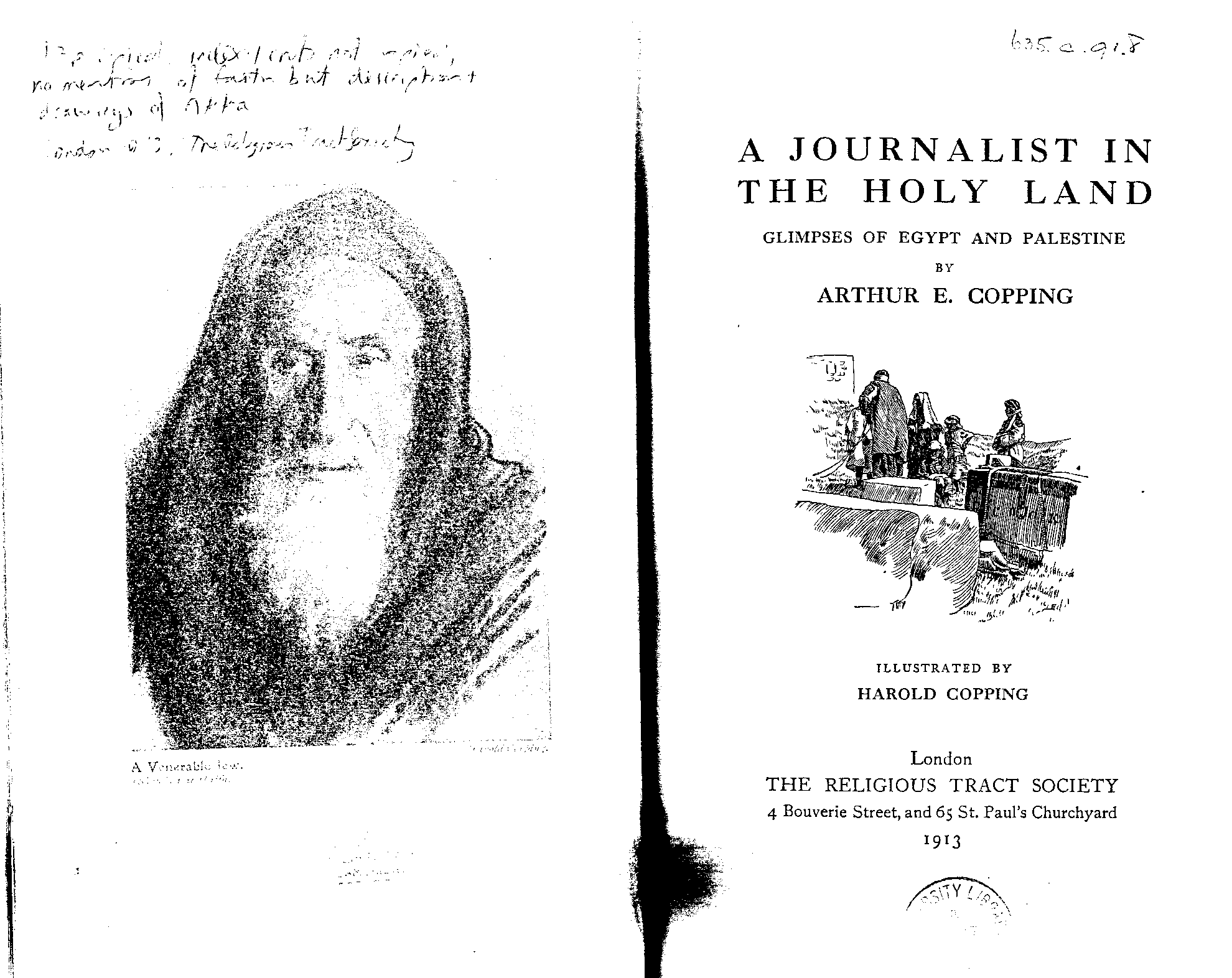
|
|
